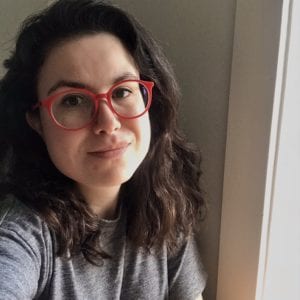Three talented new interns have joined the Press this spring—remotely, from around the country—and it’s our pleasure to introduce you to each of them here. We’ll share their 60-second Q&As every #MeettheInternMonday in the coming weeks, so check back!
P.S. Interested in an internship with us in Summer 2022? Applications are due March 15. Learn more.
Meet Hafsa
 CCP: What’s your favorite aspect of the intern experience at Copper Canyon Press so far?
CCP: What’s your favorite aspect of the intern experience at Copper Canyon Press so far?
H: My favorite aspect of being an intern at CCP is getting to listen stories of, learn, and grow under the guidance of an overwhelmingly warm and welcoming team—couldn’t be more grateful for how open they’ve been with us!
CCP: Please tell us about a forthcoming Copper Canyon title you’re excited about, and why.
H: Though I’m excited about all forthcoming CCP titles, I’m looking forward the most to Akwaeke Emezi’s Content Warning: Everything, not only because I’m incredibly impressed by how Emezi is a multi-genre writer and has weaved beautiful adult and YA stories that I’ve thoroughly enjoyed but also because their debut poetry collection with CCP addresses themes close to my heart like that of homesickness, spirituality, and grief.
CCP: Please give us a line from a poem that you can’t get out of your head.
H: “As if our responsibilities to each other end at the border of our / countries, or at our cities, or half-way across our cities, or at our / back doors, or at our skins. No.”—from The Vertical Interrogation of Strangers by Bhanu Kapil
Meet Veronica
 CCP: What’s your favorite aspect of the intern experience at Copper Canyon Press so far?
CCP: What’s your favorite aspect of the intern experience at Copper Canyon Press so far?
V: To be witness to the lives of these books at every stage—from manuscript submission to the shelf and beyond—is awe-inspiring, and I look forward to immersing myself even more fully in the months to come. On a personal level, it is also deeply affirming to be surrounded by other poets who care deeply for the craft and dedicate their lives to its authors and readers, especially in a culture that often does not know what to do with poetry.
CCP: Please tell us about a forthcoming Copper Canyon title you’re excited about, and why.
V: I’m particularly excited for Taneum Bambrick’s “Intimacies, Received,” which will be published in Fall 2022. As we saw with “Vantage,” Bambrick explores the complexities of violence and trauma through highly textured landscapes and characters, refusing the idea that the narrative and the lyrical exist in opposition. I look forward to her sensory-driven storytelling and sonic play.
CCP: Please give us a line from a poem that you can’t get out of your head.
V: I am always thinking of the concluding lines of “The Last Thing” by Ada Limón: “I can’t help it. I will / never get over making everything / such a big deal.”
Meet Kaci
 CCP: What’s your favorite aspect of the intern experience at Copper Canyon Press so far?
CCP: What’s your favorite aspect of the intern experience at Copper Canyon Press so far?
K: Since my first day at the Press, every staff member has welcomed my questions, ideas, and requests for hands-on engagement in their respective departments. My curiosity is encouraged, and I feel like an integral part of the team. I’m grateful I get to tailor my internship experience across Editorial, Production, Marketing, and Development, while being mentored by those who share my belief that poetry is our most vital and inclusive form of expression.
CCP: Please tell us about a forthcoming Copper Canyon title you’re excited about, and why.
K: I read Victoria Chang’s Obit in one sitting—I couldn’t put it down! Still pondering her intimate exploration of grief, I’m eager to dive into her sixth collection The Trees Witness Everything, forthcoming in April 2022. It reads as a natural poetic extension of Obit, as it has lingering roots in her mother’s loss, yet grows hopefully outward in her exploration of Japanese tanka. Told in syllabic wakas, I am excited for another collection by a fellow Asian-American poet where every poem, every line, feels essential.
CCP: Please give us a line from a poem that you can’t get out of your head.
K: “Certain languages contain more kinds of rain than others, and I / have eaten them all.” —from Nina Mingya Powles’s “Field Notes on a Downpour” in Magnolia, 木蘭
As someone who grew up in Mānoa, Hawaiʻi and now resides in the Pacific Northwest, I’ve always been a bit obsessed with rain. In ʻōlelo Hawaiʻi there are over 400 names for the phenomenon, and in Mandarin, its character, 雨, looks like droplets framed in my living room window. This line reminds me of both the English language’s limitations, and its potential to learn from other languages, particularly in poetry.